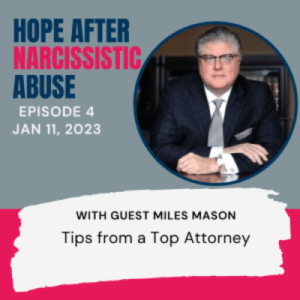Why Surviving Divorce with a Narcissist Must Include Therapy
What are the goals of divorce therapy? Seek professional mental health counseling when divorcing a narcissist. Why begin therapy as soon as the divorce gets started.
Miles Mason, Sr. guests on the new podcast by Amy Helms, Hope After Narcissistic Abuse, Jan. 11, 2023. Mason’s podcast episode link: Financial Abuse During Divorce. Podcast platforms include Apple, Spotify, Google, and others.
Amy Helms:
I think back to your question about getting someone in therapy, back to just the general term, narcissism. Narcissists do tend to go after successful, smart women because it does help with the ego, the dynamic. And people that have that successful, “I’m good.” It does tend to have that stereotype of going to therapy. “I should know better. I shouldn’t need this.” And so, it can be a little bit hard to admit I need help.
Miles Mason:
Right. And what I see is that they’ve self-identified the abuse in the relationship, or a friend or family member has said, “This is your problem. Here, read this book.” They read 10 pages in the book. They say, “Yeah, that’s me.” And they think they’re on the road to recovery once they’ve identified it. What’s so insidious about it is how it just seeps into your soul, if you will, into your core personality and essentially changes your DNA. And coming out of that, as a therapist you know, there are lots of ups and downs and extremes that come following that realization.
What is scary to me as a divorce lawyer, is that I need that clear head, because we’re going to make some decisions that are going to impact the rest of your life. It could be hundred thousand dollars. It could be millions of dollars on the line. And how do I advise somebody who’s either terribly angry or terribly sad, and the emotional response they’re having is rational and reasonable?
Because one of the things, especially for court, what you don’t want to do is appear angry and bitter. That’ll turn off any judge, even though, as the lawyer, I can explain in openings, “Look, my client’s angry. He or she’s been abused for the last 15, 18 years. She was scared to death of talking to anybody about these problems. It interfered in a relationship with her kids, this, that, and the other. He or she couldn’t go back into the workforce.” And so, all these terrible things that have happened to my client have impacted them negatively. Now, the only way I’m going to get real evidence into the record about the damage is through a mental health professional or a vocational expert, but it’s still going to come off as anger and bitterness instead of, “I just want to get my fair share of the net marital estate.” And that can be tremendously challenging for the lawyers.
Amy Helms:
So, do you offer any advice to people listening that might be in this journey? Or is it just something to work on with their attorneys?
Miles Mason:
The core advice is pretty straightforward and nothing terribly unique. Number one, get an emotional support team. Most clients when they come in to visit with me already have identified a friend or family member who’s helping them with the journey. And most likely, that person’s been telling them for the last several years to go see a divorce lawyer. So, I like to include the emotional support team in decision making whenever we can.
Now, granted the emotional support team members are not under the attorney-client privilege. But what are the discussions we’re having? Do you need to go and get counseling or therapy? And, like many lawyers, we maintain a list of people locally that they may want to go visit with. Also, if we have access to a list of mental health professionals that’s available on an insurance program through their employment or their spouse’s employment, we’re going to call one of our trusted psychologists in the area and say, “Who on this list should we refer our client to?” So, we’ll do some of that work for them.
The financial support team is there to help pay the bill, and make advice regarding potential settlement, and help make some financial recommendations on what’s fair, just, and reasonable. And sometimes that might include a certified divorce financial analyst, which is always very helpful. And then, we’re the legal team. And so, when we break it down that way, we try to say, “Look, you don’t want to rely on my therapy skills because I’ve never been trained. I’m not a big hugger. I’m not the guy you hug. I’m not the guy you invite over to your house for beverages, a glass of wine.” No, nobody invites me over for that.
I’m a tool, in hopefully a good sense. I’m here to maximize the likelihood of a fair, just, and reasonable settlement. And then if we can’t settle, we represent you, be your voice in the courtroom. And a lot of times we get a lot of confused looks from our client, and then we know. The other side of the same coin is a very popular saying. “They don’t care how much until they know how much you care.” And so, by our actions, not by our words, we try to show we care a tremendous amount about the details of making sure that we’re doing what needs to be done to, not just adequately representing, but zealously representing them. And sometimes, that means getting back to the narcissist, waiting until the narcissist makes their move on the chess board or not, for making that decision whether to turn left or turn right. We make recommendations. The client makes decisions.
For more, see Miles Mason’s The Complete Guide to Divorcing a Narcissist, a seven part video series.
Learn more about Amy Helms, her therapy practice, and her podcast here.











